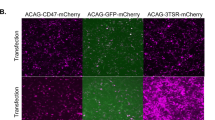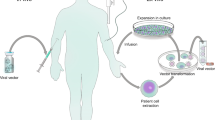Abstract
A variety of approaches has demonstrated that interfering with tumor-induced angiogenesis may be an effective strategy in cancer therapy. However, it is likely that to be most effective such strategies will require extended suppression of the angiogenic process. Gene therapy offers a possible approach to achieve sustained release of a therapeutically potent transferred gene product. In the present study the angiogenesis inhibitor endostatin was expressed through a recombinant adeno-associated viral (rAAV) vector and shown to be biologically active in vitro and in vivo. Intramuscular injection of rAAV-HuEndo (1×109 i.u.) led to a sustained serum endostatin level of ∼35–40 ng/mL. This endostatin level was sufficient to inhibit tumor cell–induced angiogenesis and to suppress both the initiation and subsequent growth of a human colorectal cancer model.
This is a preview of subscription content, access via your institution
Access options
Subscribe to this journal
Receive 12 print issues and online access
$259.00 per year
only $21.58 per issue
Buy this article
- Purchase on Springer Link
- Instant access to full article PDF
Prices may be subject to local taxes which are calculated during checkout









Similar content being viewed by others
References
Folkman J . Angiogenesis in cancer, vascular, rheumatoid and other disease Nat Med 1995 1: 27–31
Carrau RL, Barnes EL, Snyderman CH et al. Tumor angiogenesis as a predictor of tumor aggressiveness and metastatic potential in squamous cell carcinoma of the head and neck Invasion Metastasis 1995 15: 197–202
Jaeger TM, Weidner N, Chew K et al. Tumor angiogenesis correlates with lymph node metastases in invasive bladder cancer J Urol 1995 154: 69–71
Weidner N, Folkman J . Tumoral vascularity as a prognostic factor in cancer Important Adv Oncol 1996 167–190
Suit HD . The scope of the problem of primary tumor control Cancer 1988 61: 2141–2147
Kerbel RS . Inhibition of tumor angiogenesis as a strategy to circumvent acquired resistance to anti-cancer therapeutic agents Bioessays 1991 13: 31–36
Denekamp J, Hill S . Angiogenic attack as a therapeutic strategy for cancer Radiother Oncol 1991 20: Suppl 1 103–112
Boehm T, Folkman J, Browder T, O'Reilly MS . Antiangiogenic therapy of experimental cancer does not induce acquired drug resistance Nature 1997 390: 404–407
Chaplin DJ, Pettit GR, Hill SA . Anti-vascular approaches to solid tumour therapy: evaluation of combretastatin A4 phosphate Anticancer Res 1999 19: 189–195
O'Reilly MS, Boehm T, Shing Y et al. Endostatin: an endogenous inhibitor of angiogenesis and tumor growth Cell 1997 88: 277–285
Dhanabal M, Ramchandran R, Waterman MJ et al. Endostatin induces endothelial cell apoptosis J Biol Chem 1999 274: 11721–11726
Dhanabal M, Ramchandran R, Volk R et al. Endostatin: yeast production, mutants, and antitumor effect in renal cell carcinoma Cancer Res 1999 59: 189–197
Bergers G, Javaherian K, Lo KM, Folkman J, Hanahan D . Effects of angiogenesis inhibitors on multistage carcinogenesis in mice Science 1999 284: 808–812
Brower V . Endostatin “cell factories” shrink rodent brain tumors Trends Mol Med 2001 7: 97–98
Nguyen JT . Adeno-associated virus and other potential vectors for angiostatin and endostatin gene therapy Adv Exp Med Biol 2000 465: 457–466
Sauter BV, Martinet O, Zhang WJ, Mandeli J, Woo SL . Adenovirus-mediated gene transfer of endostatin in vivo results in high level of transgene expression and inhibition of tumor growth and metastases Proc Natl Acad Sci USA 2000 97: 4802–4807
Morral N, O'Neal W, Rice K et al. Administration of helper-dependent adenoviral vectors and sequential delivery of different vector serotype for long-term liver-directed gene transfer in baboons Proc Natl Acad Sci USA 1999 96: 12816–12821
Muzyczka N . Use of adeno-associated virus as a general transduction vector for mammalian cells Curr Top Microbiol Immunol 1992 158: 97–129
Rolling F, Samulski RJ . AAV as a viral vector for human gene therapy. Generation of recombinant virus Mol Biotechnol 1995 3: 9–15
Murphy JE, Zhou S, Giese K, Williams LT, Escobedo JA, Dwarki VJ . Long-term correction of obesity and diabetes in genetically obese mice by a single intramuscular injection of recombinant adeno-associated virus encoding mouse leptin Proc Natl Acad Sci USA 1997 94: 13921–13926
Xiao X, Li J, Samulski RJ . Efficient long-term gene transfer into muscle tissue of immunocompetent mice by adeno-associated virus vector J Virol 1996 70: 8098–8108
Mitchell M, Jerebtsova M, Batshaw ML, Newman K, Ye X . Long-term gene transfer to mouse fetuses with recombinant adenovirus and adeno-associated virus (AAV) vectors Gene Ther 2000 7: 1986–1992
Lalwani A, Walsh B, Reilly P et al. Long-term in vivo cochlear transgene expression mediated by recombinant adeno-associated virus Gene Ther 1998 5: 277–281
Nguyen JT, Wu P, Clouse ME, Hlatky L, Terwilliger EF . Adeno-associated virus-mediated delivery of antiangiogenic factors as an antitumor strategy Cancer Res 1998 58: 5673–5677
Grimm D, Kleinschmidt JA . Progress in adeno-associated virus type 2 vector production: promises and prospects for clinical use Hum Gene Ther 1999 10: 2445–2450
Zolotukhin S, Byrne BJ, Mason E et al. Recombinant adeno-associated virus purification using novel methods improves infectious titer and yield Gene Ther 1999 6: 973–985
Auerbach R, Morrissey LW, Sidky YA . Regional differences in the incidence and growth of mouse tumors following intradermal or subcutaneous inoculation Cancer Res 1978 38: 1739–1744
Weidner N, Semple JP, Welch WR, Folkman J . Tumor angiogenesis and metastasis-correlation in invasive breast carcinoma N Engl J Med 1991 324: 1–8
Fox SB, Leek RD, Weekes MP, Whitehouse RM, Gatter KC, Harris AL . Quantitation and prognostic value of breast cancer angiogenesis: comparison of microvessel density, Chalkley count, and computer image analysis J Pathol 1995 177: 275–283
Kessler PD, Podsakoff GM, Chen X et al. Gene delivery to skeletal muscle results in sustained expression and systemic delivery of a therapeutic protein Proc Natl Acad Sci USA 1996 93: 14082–14087
Dhanabal M, Volk R, Ramchandran R, Simons M, Sukhatme VP . Cloning, expression, and in vitro activity of human endostatin Biochem Biophys Res Commun 1999 258: 345–352
Ding YH, Javaherian K, Lo KM et al. Zinc-dependent dimers observed in crystals of human endostatin Proc Natl Acad Sci USA 1998 95: 10443–10448
Chen QR, Kumar D, Stass SA, Mixson AJ . Liposomes complexed to plasmids encoding angiostatin and endostatin inhibit breast cancer in nude mice Cancer Res 1999 59: 3308–3312
Szary J, Szala S . Intra-tumoral administration of naked plasmid DNA encoding mouse endostatin inhibits renal carcinoma growth Int J Cancer 2001 91: 835–839
Blezinger P, Wang J, Gondo M et al. Systemic inhibition of tumor growth and tumor metastases by intramuscular administration of the endostatin gene Nat Biotechnol 1999 17: 343–348
Regulier E, Paul S, Marigliano M et al. Adenovirus-mediated delivery of antiangiogenic genes as an antitumor approach Cancer Gene Ther 2001 8: 45–54
Chen CT, Lin J, Li Q et al. Antiangiogenic gene therapy for cancer via systemic administration of adenoviral vectors expressing secretable endostatin Hum Gene Ther 2000 11: 1983–1996
Feldman AL, Restifo NP, Alexander HR et al. Antiangiogenic gene therapy of cancer utilizing a recombinant adenovirus to elevate systemic endostatin levels in mice Cancer Res 2000 60: 1503–1506
Tripathy SK, Black HB, Goldwasser E, Leiden JM . Immune responses to transgene-encoded proteins limit the stability of gene expression after injection of replication-defective adenovirus vectors Nat Med 1996 2: 545–550
Ge Y, Powell S, Van Roey M, McArthur JG . Factors influencing the development of an anti-factor IX (FIX) immune response following administration of adeno-associated virus-FIX Blood 2001 97: 3733–3737
Berns KI, Giraud C . Adenovirus and adeno-associated virus as vectors for gene therapy Ann NY Acad Sci 1995 772: 95–104
Herzog RW, Hagstrom JN, Kung SH et al. Stable gene transfer and expression of human blood coagulation factor IX after intramuscular injection of recombinant adeno-associated virus Proc Natl Acad Sci USA 1997 94: 5804–5809
Fisher KJ, Jooss K, Alston J et al. Recombinant adeno-associated virus for muscle directed gene therapy Nat Med 1997 3: 306–312
Herzog RW, Yang EY, Couto LB et al. Long-term correction of canine hemophilia B by gene transfer of blood coagulation factor IX mediated by adeno-associated viral vector Nat Med 1999 5: 56–63
Carter BJ, Flotte TR . Development of adeno-associated virus vectors for gene therapy of cystic fibrosis Curr Top Microbiol Immunol 1996 218: 119–144
Jooss K, Yang Y, Fisher KJ, Wilson JM . Transduction of dendritic cells by DNA viral vectors directs the immune response to transgene products in muscle fibers J Virol 1998 72: 4212–4223
Jooss K, Ertl HC, Wilson JM . Cytotoxic T-lymphocyte target proteins and their major histocompatibility complex class I restriction in response to adenovirus vectors delivered to mouse liver J Virol 1998 72: 2945–2954
Wen XY, Bai Y, Stewart AK . Adenovirus-mediated human endostatin gene delivery demonstrates strain-specific antitumor activity and acute dose-dependent toxicity in mice Hum Gene Ther 2001 12: 347–358
Acknowledgements
This work was supported by USPNS Grant CA89655 and a STOP! Children's Cancer Research Grant of the University of Florida. Christian Teschendorf was supported by a fellowship from the Deutsche Krebshilfe, Mildred-Scheel Stiftung.
Author information
Authors and Affiliations
Corresponding author
Rights and permissions
About this article
Cite this article
Shi, W., Teschendorf, C., Muzyczka, N. et al. Adeno-associated virus–mediated gene transfer of endostatin inhibits angiogenesis and tumor growth in vivo. Cancer Gene Ther 9, 513–521 (2002). https://doi.org/10.1038/sj.cgt.7700463
Received:
Published:
Issue Date:
DOI: https://doi.org/10.1038/sj.cgt.7700463
Keywords
This article is cited by
-
Replication-deficient rSV40 mediate pancreatic gene transfer and long-term inhibition of tumor growth
Cancer Gene Therapy (2007)
-
Prevention of postoperative progression of pulmonary metastases in osteosarcoma by antiangiogenic therapy using endostatin
Journal of Orthopaedic Science (2007)
-
Endostatin inhibits VEGF-A induced osteoclastic bone resorption in vitro
BMC Musculoskeletal Disorders (2006)
-
Endostatin therapy reveals a U-shaped curve for antitumor activity
Cancer Gene Therapy (2006)
-
Treatment of human disease by adeno-associated viral gene transfer
Human Genetics (2006)



